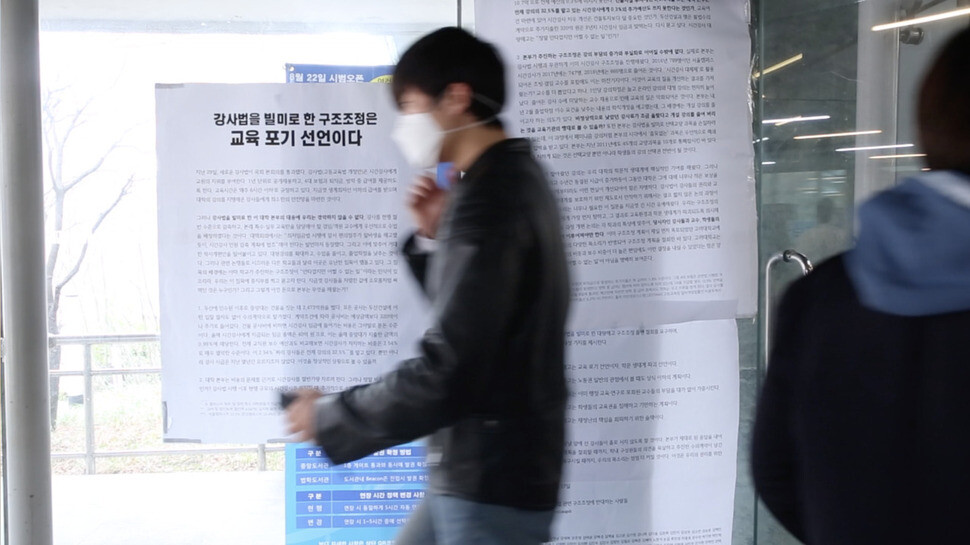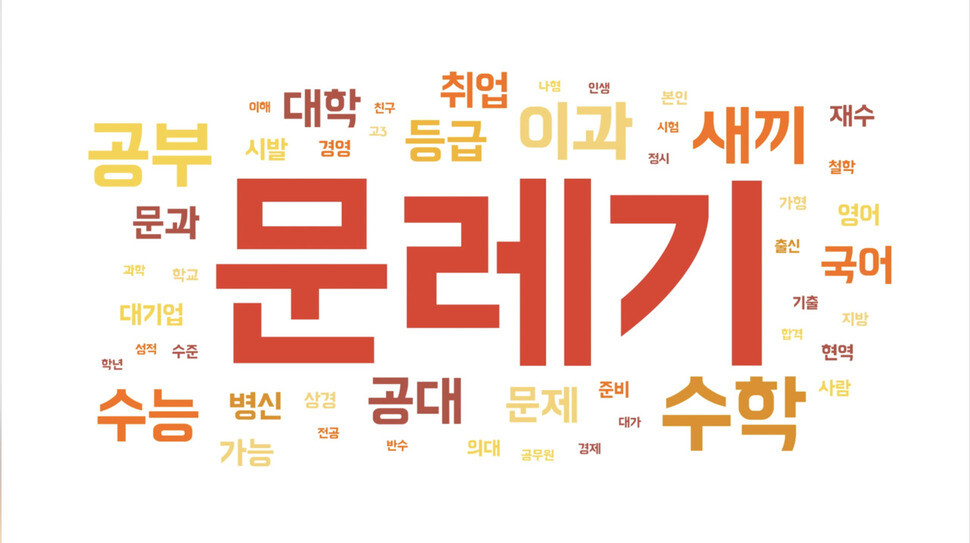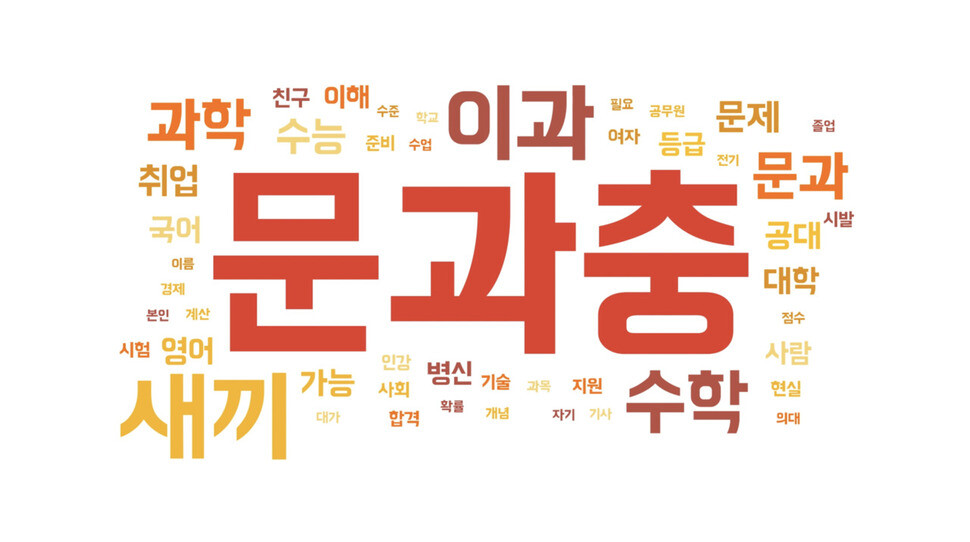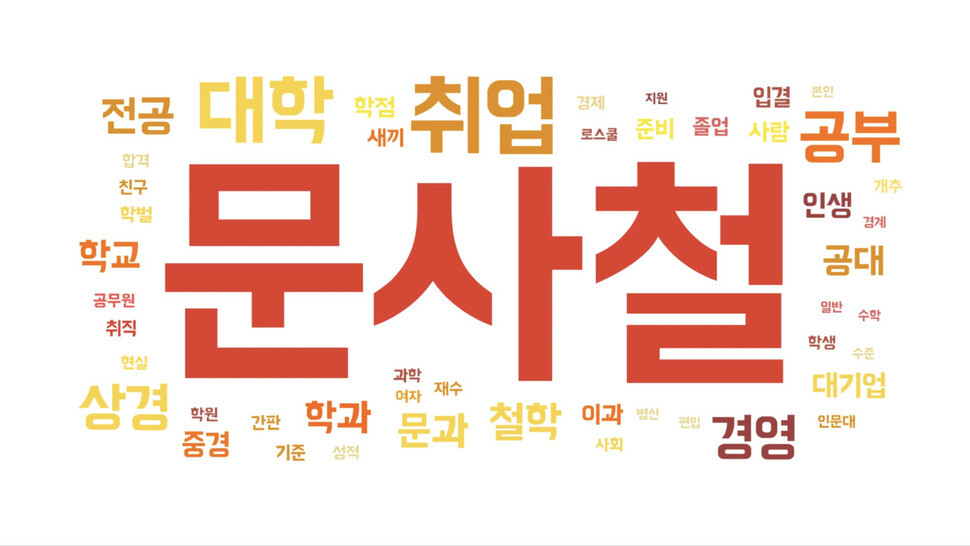hankyoreh
Links to other country sites 다른 나라 사이트 링크
Hate speech toward liberal arts major proliferates on S. Korean campuses

Hate speech toward liberal arts departments and majors is appearing with increasing frequency in the university community. Some observers fret that the situation is escalating beyond jocular teasing, disregard and self-mockery to include expressions of collective contempt. The Hankyoreh and the Huffington Post Korea looked into the forms the discourse is taking and the factors behind it.

From “sorry” to “vermin”
The term munsonghamnida – roughly translated as “I’m sorry for being a liberal arts major” – has existed since the past. It was used a self-deprecating phrase by liberal arts students – when they did not understand technical terminology, for example. But a look at online environments today uncovered the proliferation of much more disparaging terms, including munregi (“liberal arts trash”) and munkwachung (“liberal arts vermin”).
We did a search for terms including munregi, munkwachung and munsacheol on the online community DC Inside, where many new coinages are in use. The term munsacheol – referring to majors in Korean or other languages and literature, history and philosophy – was previously used as a reference to pure academics, but has recently come into common parlance as a disparaging term for “useless” disciplines.

DC Inside shows up to 2,000 posts for each search term. By distribution, the last 2,000 posts for each keyword as of Mar. 14 dated back to November 2018 for munkwachung, September 2018 for munregi and July 2018 for munsacheol. This meant that munkwachung had been in use most frequently, with 2,000 posts appearing in just a short period of time. Munsong posts dated back to December 2015.
A frequency analysis was performed using the 2,000 posts found for each keyword (munregi, munkwachung, and munsacheol) as a corpus, or a text for computer analysis. The process was meant to examine what other words these keywords were used together with. For all three corpora, the terms were frequently used together with the terms saekki and byeongsin, roughly meaning “asshole” and “retard.”
The word chwieop (“employment”) appeared most frequently with munsacheol (329 times). The reason had to do with the large number of messages attacking the disciplines in question as being less “employable” than other majors. It also appeared together with a number of other terms that did not appear with the other keywords, including ipgyeol (“entrance exam results”), chwijik (“employment”), ganpan (“curriculum vitae”), and “law school”. The most representative posts suggested that law school was “the only answer” for language, history and philosophy majors or questioned why students would choose those majors instead of law or business. The results suggested that the term munsacheol was being applied within an employment-related context.

For the munregi corpus, the top two terms were suhak (“scholastic ability,” 275 appearances) and gongbu (“study,” 228). Particularly notable among the top 50 terms for the corpus were items related to the College Scholastic Ability Test (CSAT) that did not appear for the other keywords, including gahyeong (“type A”), nahyeong (“type B”), and gichul (“questions from previous exams”). They appeared in messages along the lines of “Those crazy fucking liberal arts trash types think a Type A Level 3 is just as inferior as a Type B Level 3.”
Of the three keywords, munkwachung was the one found most often used in connection with disparaging and aggressive language. The most frequently co-occurring term was saekki (“asshole”) in first place with 220 appearances; byeongsin (“retard,” 56) and sibal (“fuck,” 44) also appeared frequently.
“Going to university for things that could be learned at Pagoda language academy”
On Mar. 5 and 7, the Hankyoreh visited the campuses of four private universities in Seoul to ask about the proliferation of hate speech about the liberal arts online.
One of the students we spoke to was a sophomore in the English department at “A” university whom we’ll refer to as “Jeong Dae-jin.”
“I don’t think there are any unnecessary majors since a university isn’t a place for getting a job but a place for learning. But from the perspective of businesses, the fact is that liberal arts majors have less technical knowledge, so I guess those expressions are partly true and partly false,” Jeong said.
“Jang Seon-ho” is a sophomore in the library and information science department at “B” university. “In real life, the only one I’ve heard is munregi, and I just let it slide because they’re my friends. But it’s not easy to laugh it off. On anonymous message boards, I think the level of hate speech is really severe,” Jang said.
We spoke with “Kim Da-ra,” who is majoring in Chinese language and literature, on the campus of “C” university. “I’ve also heard people tell me that I’m going to university for something I could learn at Pagoda language academy,” Kim said.
Remarks that are critical of the liberal arts are also common in misogynistic contexts. “The criticism aimed at feminism and at the liberal arts seem to take on a very similar form. I find it extremely insulting when people refer to us as the handwritten poster department or ‘the department,’ using quotation marks,” said “Shin Su-hye,” a senior in the department of German literature at “B” university. Shin was referring to the fact that students frequently put up handwritten posters about sexual harassment on campus.
When asked about the expression ‘the department,’ Jang Seon-ho, who is studying at the same university, said, “I got the impression that this was hate speech disparaging the liberal arts as well as feminism, since there are a lot of females in the liberal arts.”
“The segment of the student body who attack liberal arts students who’ve broken with the assumption that education is about getting a job and particularly female liberal arts students with a feminist perspective on the grounds that their university has stricter emissions or a higher job placement rate appears to reflect a subconscious internalization of a misplaced sense of superiority,” said Kwak Deok-ju, a professor of education at Seoul National University.
Where are these derogatory expressions coming from?
These hateful phrases about the liberal arts have been disseminated by a culture that ranks academic subjects according to their likelihood of landing people a job. On the anonymous message boards at each university and on Everytime, an anonymous online community for university students, slang used to rank departments is frequently used. There are numerous acronyms that lump together departments: language and literature, history and philosophy are called munsacheol; architecture, urban planning and civil engineering are geondoto, electrical and electronic engineering, chemical engineering and mechanical engineering are jeonhwagi; and business and economics are gyeonggyeong. These are typically used with the greater-than sign as follows: “jeonhwagi > geondoto > munsacheol.”
“One of my classmates said that liberal arts majors seem to engage in pointless theorizing and that she isn’t sure exactly what they study,” said “Choe Ji-yeon,” a junior in energy engineering at “B” university. “One of my professors said that we get to handle money but that people in the liberal arts and the natural sciences will never have a chance to do so.”

Another viewpoint is that the job crunch is making this worse. “Most of these people went to engineering school to get a job. When they find out that even they have trouble getting a job, I guess they go on these websites and bash those who are comparatively weaker in an attempt to verify their own worth,” said “Kang Yeong-jae,” a sophomore in new materials engineering at “C” university.
Similar attitudes came up repeatedly in interviews with students. “I figure they’re engaging in such ridicule because they’re going to universities that are focused on getting a job after graduation,” said Jeon Seong-cheol, a graduate student in communications at “C” university.
“There’s a widespread tendency to set up a hierarchy based on employment and to cut down other people as a way of comforting yourself with the idea that at least you’re better than ‘those people,’” Choe Ji-yeon said.
Another factor here is the substantial demand for engineering majors in the job market and students’ emerging preference for engineering majors, which has made liberal arts majors something of a “minority.” The problem is that the very fact that hate speech is growing could lead to the discrimination and exclusion of minorities and the disadvantaged.
“This could be described as a type of sorting. By separating the minority of pure liberal arts majors from other departments and attacking them, they’re expressing a petty sense of superiority. The tendency of taking pleasure out of attacking other people online appears to be taking root in our culture just like in Japan’s gaming culture,” said Kwak Geum-ju, a professor of psychology at Seoul National University.
“The last decade of education policy, which has focused funding on so-called ‘money-making departments’ and which has emphasized technical education through industrial-academic cooperation, is responsible for spreading the market’s narrative of money to the university,” said Lee Na-yeong, a professor of sociology at Chung-Ang University. “The value that students are being taught at universities today is that it’s enough for them to succeed. That’s a failure of education.”
By Kwon O-sung, Park Se-hoe and Lee Yoon-seob, staff reporters, and Lee So-jeong, Huffington Post Korea reporter
[%%IMAGE4%%]
Please direct comments or questions to [english@hani.co.kr]

Editorial・opinion
![[Column] Park Geun-hye déjà vu in Yoon Suk-yeol [Column] Park Geun-hye déjà vu in Yoon Suk-yeol](https://flexible.img.hani.co.kr/flexible/normal/500/300/imgdb/original/2024/0424/651713945113788.jpg) [Column] Park Geun-hye déjà vu in Yoon Suk-yeol
[Column] Park Geun-hye déjà vu in Yoon Suk-yeol![[Editorial] New weight of N. Korea’s nuclear threats makes dialogue all the more urgent [Editorial] New weight of N. Korea’s nuclear threats makes dialogue all the more urgent](https://flexible.img.hani.co.kr/flexible/normal/500/300/imgdb/original/2024/0424/7317139454662664.jpg) [Editorial] New weight of N. Korea’s nuclear threats makes dialogue all the more urgent
[Editorial] New weight of N. Korea’s nuclear threats makes dialogue all the more urgent- [Guest essay] The real reason Korea’s new right wants to dub Rhee a founding father
- [Column] ‘Choson’: Is it time we start referring to N. Korea in its own terms?
- [Editorial] Japan’s rewriting of history with Korea has gone too far
- [Column] The president’s questionable capacity for dialogue
- [Column] Are chaebol firms just pizza pies for families to divvy up as they please?
- [Column] Has Korea, too, crossed the Rubicon on China?
- [Correspondent’s column] In Japan’s alliance with US, echoes of its past alliances with UK
- [Editorial] Does Yoon think the Korean public is wrong?
Most viewed articles
- 1‘We must say no’: Seoul defense chief on Korean, USFK involvement in hypothetical Taiwan crisis
- 2N. Korean delegation’s trip to Iran shows how Pyongyang is leveraging ties with Moscow
- 3‘Weddingflation’ breaks the bank for Korean couples-to-be
- 4[Reportage] On US campuses, student risk arrest as they call for divestment from Israel
- 5Amnesty notes ‘erosion’ of freedom of expression in Korea in annual human rights report
- 6[Column] Park Geun-hye déjà vu in Yoon Suk-yeol
- 7Korea sees more deaths than births for 52nd consecutive month in February
- 8[Editorial] New weight of N. Korea’s nuclear threats makes dialogue all the more urgent
- 9Will NewJeans end up collateral damage in internal feud at K-pop juggernaut Hybe?
- 10[Guest essay] The real reason Korea’s new right wants to dub Rhee a founding father